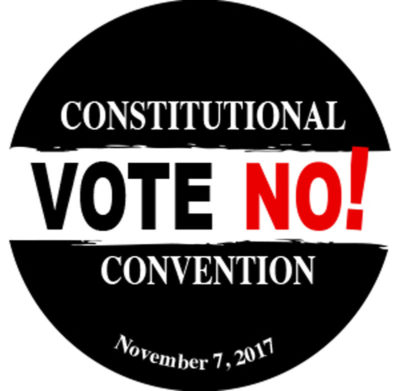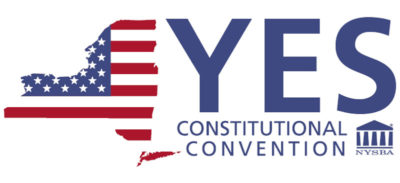The most important–and yet most obscure—statewide vote on the ballot this Election Day involves the Constitutional Convention, or Con-Con.
The New York State Constitution requires that every 20 years the voters must decide if a convention should be held to consider amending the existing foundational document.
Earlier this decade, an advocacy group called the New York Legislature the most dysfunctional in the United States. To proponents, a con-con would be a way to bypass the often obstructionist legislature and entrenched elected officials, notorious for being unfavorable toward perceived common sense proposals that threaten their status quo.
If the people say yes to Proposition 1 on the 2017 ballot, there will begin a year-long process to nominate and elect convention delegates. That election will take place November 2018 and the convention itself would begin in April 2019. There will be three delegates each from the 63 senatorial districts, plus 15 chosen at-large from across the state.
 Changes proposed by the convention will then be presented to the voters.
Changes proposed by the convention will then be presented to the voters.
Conventions are rare; the last one took place in 1967. According to former New York State Assemblyman Jerry Kremer, whose Empire Government Strategies has published a book about state conventions, their history “is full of cronyism, runaway costs and questionable ethics….previous conventions produced few results and served as little more than duplicate legislative sessions, dominated by the same insiders, special interests and sitting lawmakers themselves.”
Unions also seem to be lining up against the con-con.
A convention, said John Duffy, treasurer and business manager of Farmingdale-based Local 138 of the International Union of Operating Engineers, would see “virtually every program, benefit, law, government authority and regulatory oversight…put into play, subject to lobbyists, special interest groups and political contributors with bottomless pockets. Our union local will aggressively campaign against that proposal.”
Duffy added, “As union members we have a range of safeguards and protections embedded in our state constitution that protects the very heart and soul of collective bargaining along with our private and public pensions, the prevailing wage, workmen’s compensation, and more. And all of it could be taken away, amended or deleted by Constitutional Convention delegates who will be answerable to no one.”
 Proponents call such talk fearmongering. They point out that most people support such union-won rights, and would vote against any attempts to decimate them.
Proponents call such talk fearmongering. They point out that most people support such union-won rights, and would vote against any attempts to decimate them.
The con-con idea is supported by the Sanctuary State Project, an all-volunteer group of civic activists. It believes a convention would heavily favor progressive interests and “represents a once-in-a-generation opportunity to win victories on voting rights, women’s rights, immigrant rights and other crucial progressive issues.”
Others in support of a convention want campaign finance and ethics reform, fair redistricting and term limits.
Art Chang, a member of the Sanctuary State Project, said, “One goal of a progressive constitutional convention would be to enact a statewide public campaign finance system that empowers political challengers to have a real shot at matching the fundraising power of politically entrenched incumbents.”


















